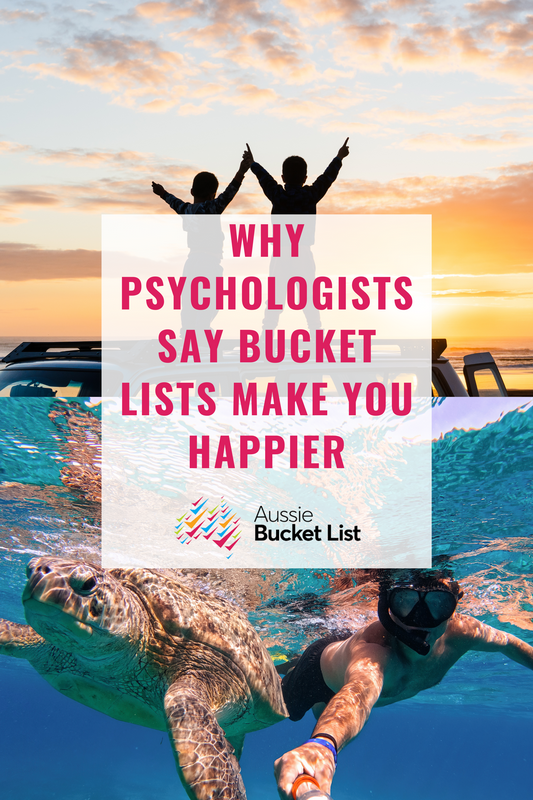The Psychology-Backed Benefits of Having (and Completing) a Bucket List
Australia 10 September 2025
The Psychology-Backed Benefits of a Bucket List: Why creating and Completing One Improves Your Life
A bucket list is more than just a fun collection of travel dreams or daring challenges. Psychologists have found that bucket lists can help us feel more motivated, improve mental health, strengthen relationships, and bring greater meaning to life.
And the science doesn’t stop at creating a list — completing bucket list goals has its own set of unique psychological benefits. From confidence and identity to reduced regret, ticking off those life goals is one of the most rewarding things you can do.
On our free Aussie Bucket List app, you can create your own interactive bucket list, tick off experiences like hiking Kondalilla Falls or swimming with whale sharks and share your progress with friends.
This cornerstone guide explores:
- Why psychologists recommend bucket lists.
- The mental health and wellbeing benefits of creating one.
- The proven psychological impact of completing bucket list experiences.
- How Australians, in particular, benefit from adventure, travel, and life goals.
- Practical steps for creating your own psychology-backed bucket list.
What Is a Bucket List?
A bucket list is a personal collection of goals, dreams, and experiences you want to achieve in your lifetime. It can include everything from travel destinations to skills you want to learn, milestones you hope to reach, and adventures you’d love to experience.
Unlike vague “someday” wishes, bucket lists give your aspirations structure, intention, and accountability. That’s why psychologists see them as powerful tools for goal setting and wellbeing.
Why Psychologists Recommend Bucket Lists
Goal-Setting Science
Research shows that people who write down goals are far more likely to achieve them. Dr. Gail Matthews (Dominican University, California) found that goal-writers were 42% more likely to achieve success compared to those who kept goals in their head.
In Australia, UNSW Sydney’s Business School found similar results in a 2020 study on goal pursuit and wellbeing: individuals with specific written goals achieved greater success and reported higher satisfaction.
Anticipation and Positive Emotions
Psychologists describe the joy of anticipatory happiness — the emotional boost we get when looking forward to something. Research by Van Boven & Ashworth (2007) shows anticipation can generate more positive feelings than retrospection.
In Australia, Tourism Research Australia confirms this effect: people feel happier simply by planning future travel and experiences. Bucket lists tap directly into this psychology, giving you a steady stream of anticipation.
Personal Growth and Self-Expansion
According to Dr. Arthur Aron’s Self-Expansion Model, humans thrive when we try new things that expand our identity and skills. A bucket list naturally encourages self-expansion by nudging you into new experiences — whether that’s hiking the Overland Track, learning to dive on the Great Barrier Reef, or mastering yoga.
Sydney psychologist Dr. Tim Sharp (“Dr. Happy”) emphasises that novelty and challenge are essential ingredients for long-term wellbeing.
Social Bonds Through Shared Experiences
Research shows that shared experiences create stronger bonds than material purchases (Kumar & Gilovich, 2015). For Australians, family trips and adventures are particularly powerful for connection — the Queensland Family and Child Commission (2018) reported that shared experiences were linked to stronger family satisfaction and youth wellbeing.
Meaning, Legacy, and Purpose
Dr. Martin Seligman’s Positive Psychology PERMA model highlights Meaning as a pillar of long-term happiness. Bucket lists aren’t just fun — they give life purpose and direction.
The Australian Psychological Society (2017) also found that older Australians who maintained future goals (such as bucket list items) experienced higher levels of positive ageing and resilience.
Navigating Life Transitions
Transitions — retirement, job changes, becoming “empty nesters” — can destabilise identity. Socioemotional Selectivity Theory (Carstensen et al., 1999) shows that emotionally meaningful goals help people adapt during change.
National Seniors Australia (2018) found that retirees with structured personal goals (like bucket lists) reported better psychological wellbeing and life engagement.
Creating a bucket list is one thing — but keeping it visible, shareable, and trackable makes it more effective. That’s exactly what platforms like Aussie Bucket List are designed for: they turn psychology research into practical tools you can use every day.
The Psychology of Completing Bucket List Experiences
Writing a bucket list is powerful, but completing those items provides a whole different layer of benefits. Here’s what psychologists say happens when you finally tick something off:
1. Sense of Accomplishment and Confidence
Crossing off a goal activates the brain’s dopamine reward system, reinforcing achievement. Psychologist Albert Bandura’s self-efficacy theory shows that success builds confidence, making you more likely to take on new challenges.
In Australia, the Black Dog Institute highlights achievement as a protective factor against stress and mental health struggles.
For example, completing a challenging hike like the Mount Coolum Summit on the Sunshine Coast doesn’t just give you a sense of accomplishment — it builds confidence for the next goal on your list.
2. Lasting Positive Memories
Experiences beat possessions every time. Gilovich & Kumar (2015) proved that experiences provide more enduring happiness than buying things. Bucket list completions create powerful memories that stay with you forever. For example, if your bucket list includes wildlife encounters, such as ticking off snorkelling the Great Barrier Reef, this experience creates memories and meaning that last a lifetime.
Tourism Australia’s studies echo this, showing that Australians place higher long-term value on unique travel experiences than on luxury purchases.
3. Stronger Identity and Narrative
Psychologist Dan McAdams explains that life stories shape identity. Completing bucket list experiences gives your story rich chapters, reinforcing who you are and what matters to you.
Griffith University research (2019) found that Australians see travel and nature-based adventures as core to personal identity, especially in the Northern Rivers and coastal communities.
4. Deeper Relationships
Shared completions — like hiking the Larapinta Trail with friends or kayaking at K’gari — create bonding moments that strengthen long-term relationships.
5. Reduced Regret
Studies on regret (Roese & Summerville, 2005) show people regret missed experiences more than missed possessions. Completing your bucket list reduces long-term regret and increases satisfaction with life choices.
The Physical Health Benefits of an Aussie Bucket List
While psychologists highlight the mental health benefits of bucket lists, research also shows that completing active, outdoor experiences provides measurable physical health improvements. An Aussie Bucket List often includes adventures like hiking national parks, snorkelling reefs, surfing beaches, or cycling through the countryside — all of which contribute to better health and longevity.
1. Increased Physical Activity
Australia’s top bucket list experiences frequently involve movement: hiking the Glass House Mountains, kayaking the Noosa Everglades, or climbing the Sydney Harbour Bridge. The Australian Institute of Health and Welfare reports that adults who meet physical activity guidelines are less likely to suffer from heart disease, diabetes, and obesity (AIHW, 2022). Bucket list activities naturally encourage people to move more, sit less, and explore outdoors.
2. Improved Cardiovascular and Respiratory Health
Adventurous activities like bushwalking, diving on the Great Barrier Reef, or trail running in the Blue Mountains elevate heart rates and build endurance. Cardiovascular exercise strengthens the heart and lungs, lowering risks of high blood pressure and improving overall stamina (Heart Foundation Australia, 2021).
3. Strength and Flexibility
From paddling on the Fraser Coast to hiking the Kangaroo Island Wilderness Trail, bucket list activities engage different muscle groups, improving strength, balance, and flexibility. Unlike structured gym workouts, these experiences are enjoyable, making it easier to stay active without it feeling like exercise.
4. Boosted Immune System
Spending time outdoors — a key component of an Aussie Bucket List — has been linked to improved immune function. Exposure to fresh air, sunlight (vitamin D), and contact with natural environments reduces inflammation and enhances immunity (University of Queensland, 2019).
5. Better Sleep Quality
Physical exertion during bucket list adventures contributes to more restful sleep. Studies show that moderate to vigorous exercise helps regulate circadian rhythms, leading to improved sleep duration and quality (Sleep Health Foundation Australia, 2020).
6. Active Ageing and Longevity
For older Australians, completing bucket list activities supports active ageing — maintaining mobility, independence, and vitality later in life. Research by National Seniors Australia (2018) highlights that engaging in meaningful physical activities improves both health outcomes and quality of life.
Why It Matters
A bucket list is not just about chasing dreams — it’s a lifestyle blueprint that motivates people to stay active, explore new environments, and prioritise health. By ticking off experiences like hiking Mount Kosciusko or snorkelling with whale sharks in Exmouth, you’re not only making memories — you’re investing in your physical wellbeing.
How to Create (and Complete) Your Own Psychology-Backed Bucket List
- Write It Down – increases success by 42%. On Aussie Bucket List, you can easily search experiences by destination, by experience type, or even search experiences nearby on our interactive map, recording your dream experiences to your free digital Aussie Bucket List profile so they’re always with you.
- Mix Big and Small – add both life-changing adventures like swimming with sea lions and everyday joys like hiking through nature.
- Make It Personal – choose goals that align with your values. Aussie Bucket List lets you filter ideas by category, from luxury retreats to eco adventures, helping you align your list with your values.
- Stay Flexible – Your Aussie Bucket List can evolve as you do. Find experiences nearby, add, remove, review and check off experiences as you go.
- Celebrate Progress – reflect on completions to reinforce positive psychology.
- Share the Journey – doing bucket list items with others strengthens relationships. Invite friends along with you, follow each other's journeys on our Aussie Bucket List app and celebrate together when you tick items off.
Key Takeaways
- Creating a bucket list provides motivation, anticipation, and a sense of purpose.
- Completing experiences boosts confidence, reduces regret, strengthens identity, and creates lifelong memories.
- In Australia, research shows bucket lists tie deeply into wellbeing, identity, and family connection.
That’s why the Aussie Bucket List platform exists — to give you a free, easy way to turn psychology-backed benefits into reality. With thousands of curated ideas (from hiking trails to waterfalls to luxury retreats), it’s the perfect tool to design a life full of experiences and meaning, whilst supporting the Australian tourism industry and small regional businesses.
Psychologists — from global leaders like Dr. Martin Seligman to Australian experts like Dr. Tim Sharp — agree: a bucket list is one of the simplest and most effective tools to live a happier, more meaningful life. And with Aussie Bucket List, you are supporting the Australian tourism industry whilst improving both your physical and mental health.
References
- Matthews, G. (2015). Goal Research Summary. Dominican University of California.
- UNSW Business School (2020). Goal pursuit and psychological wellbeing.
- Van Boven, L., & Ashworth, L. (2007). Anticipation vs retrospection. Journal of Experimental Psychology.
- Tourism Research Australia (2019). State of the Industry Report.
- Aron, A., & Aron, E. (1986). Love and the expansion of self. Hemisphere Publishing.
- Sharp, T. (2011). The Happiness Handbook. The Happiness Institute, Sydney.
- Kumar, A., & Gilovich, T. (2015). Experiences vs possessions. Journal of Personality and Social Psychology.
- Queensland Family and Child Commission (2018). Growing Up in Queensland Report.
- Seligman, M. E. P. (2011). Flourish. Free Press.
- Australian Psychological Society (2017). Positive ageing and wellbeing.
- Carstensen, L., Isaacowitz, D., & Charles, S. (1999). Socioemotional selectivity theory. American Psychologist.
- National Seniors Australia (2018). A new retirement story.
- Bandura, A. (1997). Self-efficacy: The exercise of control. Freeman.
- Black Dog Institute (2018). Achievements and mental wellbeing.
- Gilovich, T., & Kumar, A. (2015). Experiential happiness research.
- McAdams, D. (2001). Narrative identity. Personality and Social Psychology Review.
- Griffith University (2019). Nature and identity in Australia.
- Roese, N., & Summerville, A. (2005). Regret regulation. Psychological Bulletin.























